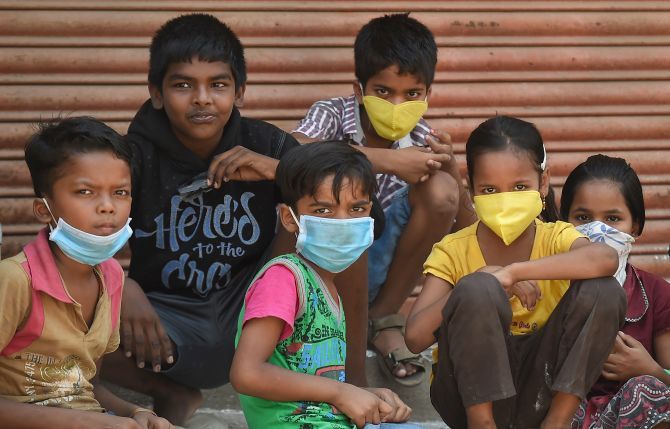 | « Back to article | Print this article |
'Make sure you provide enough support (income, nutrition, healthcare, and housing) to migrants stuck (and their households), so they are not compelled to seek work or migrate back.'
'Otherwise, the risk of contagion is extreme.'

Varun Aggarwal, founder of India Migration Now -- a migration data, policy, and advocacy organisation based in Mumbai -- has studied migration in India extensively.
"I would absolutely prioritise screening for these workers over other communities, given the contagion risks," Aggarwal tells Aditi Phadnis.
Are we seeing the largest migration movement in recent Indian history?
It is difficult to say so, given that the lockdown window is small. Not every migrant managed to cross the state/district boundary.
However, the intensity of the movement on foot was striking.
While millions of seasonal/short-term migrants return home every summer for the harvest season, it's only now that the movement has received national attention.
People go home for harvesting, but once it ends, don't the very issues that made them migrate -- food, money, ambition -- return to haunt them?
The frantic reverse migration at present is not because of harvesting needs, but because of the income shock (due to ceasing of all sectors dependent on migrant labour).
Migrant households have fixed strategies of boosting village incomes, with urban/destination wages during the non-agri season.
They keep a very small portion of their wages with themselves and remit 80 to 90 per cent back home.
Therefore, the moment work stops or the off season ends, they return.
This strategy is influenced by the fact that migrant workers are largely excluded from policy frameworks (domicile restrictions) of the destination states.
If and when the urban economy restarts (subject to length of the lockdown or re-emergence of liquidity/investment in migrant-dependent sectors), I expect migration to restart.
This is a crucial income boosting strategy for rural households.
Now that most labourers are said to have returned home, what should the government do -- keep them there or ask them to return?
It is unlikely that the majority of labourers have returned home. On the contrary, it looks like most of them are stuck in their destination states or in transit.
Here is a guiding philosophy for policymakers -- make sure you provide enough support (income, nutrition, healthcare, and housing) to migrants stuck (and their households), so they are not compelled to seek work or migrate back.
Otherwise, the risk of contagion is extreme; we have examples from Italy and China. Especially short-term seasonal migrants, working in informal settings, should be identified and supported.
In addition to programmes/schemes, the focus should be on accurately and clearly communicating these support measures and setting up access points, such as mobile financial agents, kirana shops as cash out/in points, delivery agents for rations, and increased capacity for civil society support.
I would absolutely prioritise screening for these workers over other communities, given the contagion risks.
Finally, states should remove all domicile restrictions from their schemes and support policies to include migrants.

Could this movement have been anticipated, and handled better?
My organisation exists because the Centre and almost all state governments have been ignorant about the role of migration throughout the history of the Indian Republic.
If anything, they consider migration a negative development that needs to be curtailed (an explicit aim of the Mahatma Gandhi National Rural Employment Guarantee Act).
They don't understand that the wealthier a household becomes, the more likely people are to migrate.
The backbone of all Indian cities -- migrant workers -- has been completely 'invisibilised'.
The private sector (like banks), too, is guilty of this.
Spread of the virus in China (to a limited extent) and Italy (to a very large extent), due to reverse migration, should have sent alarm bells ringing for policymakers. But it did not.
This is negligence of gigantic proportions, and a severe indictment about the lack of understanding as well as data we have regarding our own country.
The fact that the 2011 Census migration data was only released in 2019 epitomises the level of indifference.
The Interstate Migrant Workmen Act has been a complete failure for the same reason.
In many ways, the government is starting with a clean slate. What should the policy on migrants now be?
First, state governments should remove all domicile restrictions from their schemes and support policies, and include migrants.
Second, they should universalise access to benefits of all central government schemes/programmes, along with expansion and early release of migration data.
Vould returning workers be putting pressure on micro-economies of their villages?
I do not think so. On the contrary, food supply will need the extra agri-workers (stuck in cities/destination regions) eventually.
Therefore, if anything, there will be labour shortfall. In addition, the loss of remittance/migration income for households needs to be compensated.